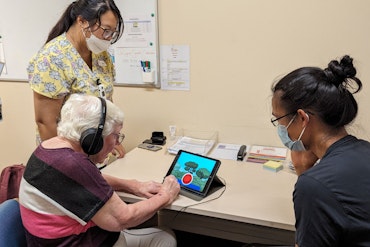‘Not valued for their work’ — aged care confusion leads to exclusion in wage increases
Head of not-for-profit aged care provider, Whiddon’s Chief Executive Officer has shared his solidarity with the many staff who remain unsure whether their pay will increase this year.
![<p>Whiddon believes that the funding should be applied across the board, from those in direct care roles to those preparing the food, which are all crucial elements of what helps to deliver holistic quality care to senior Australians. [Source: Shutterstock]</p>](https://agedcareguide-assets.imgix.net/news/articles/wp/bewilderedchefpay.jpg?fm=pjpg&format=auto&w=550&q=65)
Whiddon believes that the funding should be applied across the board, from those in direct care roles to those preparing the food, which are all crucial elements of what helps to deliver holistic quality care to senior Australians. [Source: Shutterstock]
Key points:
- Following the Federal Budget’s welcomed announcement of a $11.3 billion dollar commitment to fund a 15 percent pay rise for aged care workers, those not in ‘direct care’ are unsure whether they will receive an increase
- The Fair Work Commission Tribunal is seeking to address seemingly excluded workers in the third stage of changes to the sector, without any guaranteed announcement in the next twelve months
- The 15 percent pay rise will roll out from June 30, 2023 — addressing existing shorages, turnover and incentive for new industry employment
Leading not-for-profit aged care provider, Whiddon Chief Executive Officer [CEO] Chris Mamarelis has advocated for the Federal Government to clarify upcoming wage increases to the aged care sector.
The 15 percent wage increase for ‘direct care’ staff announced by the Albanese Government is intended to address workforce shortages and staff retention in the sector, with regulation placing pressure on care providers to meet new targets. Some residential aged care facilities, such as the three closing Wesley Mission homes in New South Wales, have announced a pivot to home care amidst the controversial 24/7 nursing reform.
The Government’s 2020 Aged Care Workforce Census highlighted that 52,801 staff were working in ancillary roles such as cooks, cleaners, and laundry assistants. Based on this data, roughly 20 percent of aged care workers will be excluded from the coming wage increase across the industry, with Mr Mamarelis estimating that just over a quarter of Whiddon’s workforce will be left without any monetary benefit.
“Whilst the 15 percent increase has been a great first step, there is still 26 percent of our workforce at Whiddon that remain in limbo. This is a considerable proportion of our personnel that are awaiting the findings of the Stage Three Work Value Hearing with no current timeline for answers,” the CEO said.
“Every employee working in aged care is crucial to the delivery of quality, holistic care. By excluding certain roles in care and delaying clarity around wage increases for ancillary care roles, the government is sending a message [to] those not in direct care roles are not valued for their work.”
Chris’ presence and experience within the aged care sector was also a point of reference for widespread reforms, as Mr Mamarelis provided expert evidence at the Royal Commission into Aged Care on both Relationship Based Care (Perth) and Aged Care Funding (Sydney).
“We believe there is a duty to non-direct care employees to set an expedited timing of the Stage ThreeWork Value Hearing to provide clarity to all who play a vital role within the aged care workforce,” Chris said.
Chris’ attitude towards the value of staff as more than just the sum of their parts can be felt in the Whiddon staff, which is comprised of over 2,500 dedicated workers.
Vanessa Baker, from Whiddon’s Catering Team at Kelso, said she feels the increase would “[…] help all our team members feel valued as we are all here for the residents”.
The delay to Stage Three, which would clarify industry workers’ rights, is something the CEO feels should be assessed, with the hope to hasten wage clarity to retain staff and continue to provide quality services for residents in aged care.























